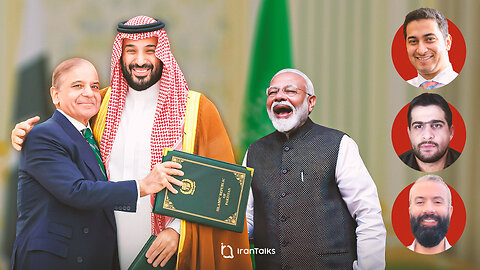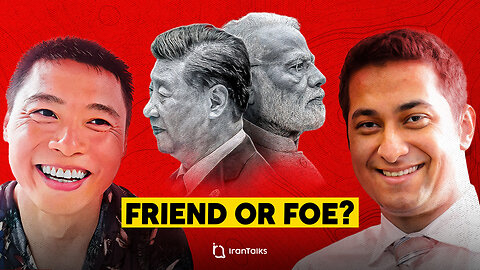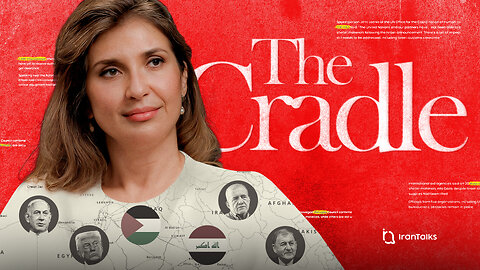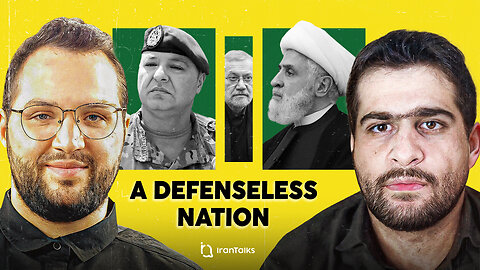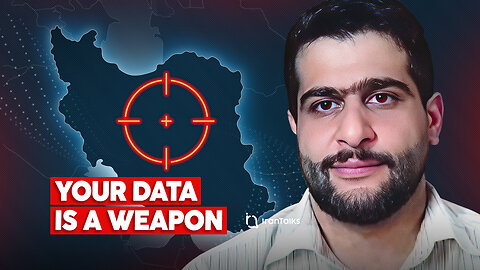
-
How AI Tells Israel Who to Bomb | Ehsan Safarnejad
 The IranTalksThe battleground has shifted. In the modern wars, the most powerful weapons aren't just missiles; they're the algorithms, data centers, and AI systems controlled by Big Tech. Welcome to the new era of digital warfare, where your online footprint can be weaponized and the narrative is controlled by unseen forces. In this critical episode of Irantalks, we are joined by tech and geopolitical analyst and AI Expert Ehsan Safarnejad to dissect the invisible digital battlefield. We explore how tech giants like Microsoft and Google are deeply embedded in military operations, raising questions about their complicity in international conflicts. We pull back the curtain on Israel's controversial "Lavender" AI system, a tool used for targeting that blurs the line between combatant and civilian, and discuss its ethical implications. Furthermore, we investigate the troubling reality of Gaza censorship, where platforms like Instagram and Meta are accused of suppressing voices and shaping global perception of the war. Is your personal data, gathered through apps like WhatsApp, being used for digital surveillance by state actors? Ehsan Safarnejad provides chilling insights into how metadata becomes a tool of war and what, if anything, we can do to protect ourselves from the ever-watchful eye of Big Tech. Don't forget to like, subscribe, and hit the notification bell for more in-depth analysis on Iran & West Asia!27 views
The IranTalksThe battleground has shifted. In the modern wars, the most powerful weapons aren't just missiles; they're the algorithms, data centers, and AI systems controlled by Big Tech. Welcome to the new era of digital warfare, where your online footprint can be weaponized and the narrative is controlled by unseen forces. In this critical episode of Irantalks, we are joined by tech and geopolitical analyst and AI Expert Ehsan Safarnejad to dissect the invisible digital battlefield. We explore how tech giants like Microsoft and Google are deeply embedded in military operations, raising questions about their complicity in international conflicts. We pull back the curtain on Israel's controversial "Lavender" AI system, a tool used for targeting that blurs the line between combatant and civilian, and discuss its ethical implications. Furthermore, we investigate the troubling reality of Gaza censorship, where platforms like Instagram and Meta are accused of suppressing voices and shaping global perception of the war. Is your personal data, gathered through apps like WhatsApp, being used for digital surveillance by state actors? Ehsan Safarnejad provides chilling insights into how metadata becomes a tool of war and what, if anything, we can do to protect ourselves from the ever-watchful eye of Big Tech. Don't forget to like, subscribe, and hit the notification bell for more in-depth analysis on Iran & West Asia!27 views -
Scott Ritter on Shifting Alliances in the Middle East
 The IranTalksIs the new threat to Israel's security a powerful NATO ally? In this riveting discussion, Irantalks sits down with renowned geopolitical analyst and former UN weapons inspector, Scott Ritter, to unpack the complex and often overlooked dynamics of Israel-Turkey relations. While the world focuses on Tehran, Ritter argues that Turkey's formidable military and strategic position in Syria present a far greater existential risk to Israel. We explore the glaring contradiction between Turkey's harsh rhetoric on Gaza and its deep economic ties with Israel, including the crucial flow of energy resources. Scott Ritter sheds light on Israel's vulnerability, highlighting its increasing international isolation and critical dependence on a wavering United States for its very survival. Join us for a deep dive into the hidden tensions that could reshape the Middle East. What is Israel's greatest fear? The answer may surprise you. Don't forget to like, subscribe, and hit the notification bell for more expert insights into Iran and West Asia. Let us know your thoughts in the comments below! #Irantalks #ScottRitter #Turkey #Israel #MiddleEast59 views 1 comment
The IranTalksIs the new threat to Israel's security a powerful NATO ally? In this riveting discussion, Irantalks sits down with renowned geopolitical analyst and former UN weapons inspector, Scott Ritter, to unpack the complex and often overlooked dynamics of Israel-Turkey relations. While the world focuses on Tehran, Ritter argues that Turkey's formidable military and strategic position in Syria present a far greater existential risk to Israel. We explore the glaring contradiction between Turkey's harsh rhetoric on Gaza and its deep economic ties with Israel, including the crucial flow of energy resources. Scott Ritter sheds light on Israel's vulnerability, highlighting its increasing international isolation and critical dependence on a wavering United States for its very survival. Join us for a deep dive into the hidden tensions that could reshape the Middle East. What is Israel's greatest fear? The answer may surprise you. Don't forget to like, subscribe, and hit the notification bell for more expert insights into Iran and West Asia. Let us know your thoughts in the comments below! #Irantalks #ScottRitter #Turkey #Israel #MiddleEast59 views 1 comment -
Why India Is Worried by Pakistan-Saudi Defense Pact?
 The IranTalksThe new Saudi Arabia–Pakistan defense pact is reshaping the security landscape of the Persian Gulf, South Asia, and beyond. From India’s geopolitical concerns to Iran’s balancing act, and even Israel’s strategic calculations, this agreement raises critical questions about military alliances, propaganda wars, and regional stability. In this in-depth discussion with Ehsan Safarnejad, Tafim Kiani, and Alok Arora, we examine: Can Saudi Arabia truly build an independent defense pact outside U.S. influence? Is Pakistan balancing economic survival with regional contradictions? How are India, Iran, and Israel reacting to this deal? Could this be the start of a new Yemen escalation—or just political theater? What role does propaganda and disinformation play in shaping the narrative? 🔔 Subscribe for more deep-dive geopolitical analysis and stay updated on the Middle East, South Asia, and global security trends #SaudiPakistanPact #MiddleEastPolitics #Geopolitics #Iran #India #Israel #Pakistan #SaudiArabia #DefensePact #YemenWar #GlobalSecurity #PersianGulf43 views
The IranTalksThe new Saudi Arabia–Pakistan defense pact is reshaping the security landscape of the Persian Gulf, South Asia, and beyond. From India’s geopolitical concerns to Iran’s balancing act, and even Israel’s strategic calculations, this agreement raises critical questions about military alliances, propaganda wars, and regional stability. In this in-depth discussion with Ehsan Safarnejad, Tafim Kiani, and Alok Arora, we examine: Can Saudi Arabia truly build an independent defense pact outside U.S. influence? Is Pakistan balancing economic survival with regional contradictions? How are India, Iran, and Israel reacting to this deal? Could this be the start of a new Yemen escalation—or just political theater? What role does propaganda and disinformation play in shaping the narrative? 🔔 Subscribe for more deep-dive geopolitical analysis and stay updated on the Middle East, South Asia, and global security trends #SaudiPakistanPact #MiddleEastPolitics #Geopolitics #Iran #India #Israel #Pakistan #SaudiArabia #DefensePact #YemenWar #GlobalSecurity #PersianGulf43 views -
China’s Role in U.S.-Israel-Iran Confrontation | Carl Zha, Elijah Magnier & Lee Camp
 The IranTalksIn this powerhouse discussion on Irantalks, we're joined by renowned experts Elijah Magnier, Carl Zha, and Lee Camp to dissect one of the most critical questions of our time: What was China's real role during the recent Iran-Israel war? 00:00 Introduction to the Project 03:44 US-Israel Empire vs. China's Peaceful Policy 08:24 China-Iran Military and Energy Cooperation 13:20 US Proxy War Strategy: From Ukraine to Taiwan 18:28 Strait of Hormuz: How China Would React to a Longer War 24:10 BRICS and De-Dollarization: China's Economic Strategy 29:53 US Military's Reliance on Chinese Rare Earth Minerals 34:36 China's Business-First Foreign Policy vs. US Pillaging 39:11 China Defies US Unilateral Sanctions on Iran 49:11 Was the China-Iran Railway a Motive for the Attack? 52:47 Existential War: The Strait of Hormuz Blockade Explained While Beijing condemned the aggression, it officially remained on the sidelines. But was this a calculated move in the great game of US China rivalry, or a missed opportunity to act as a global leader? Our guests dive deep into China's foreign policy, debating the strategic thinking in Beijing. We explore the red lines that might have forced China's hand, particularly the threat to its energy supplies passing through the vital Strait of Hormuz. This conversation goes beyond the headlines to analyze the future of China Iran relations. Will the conflict push Tehran and Beijing into a deeper military and security alliance? Or will China cautiously protect its economic interests, like the Belt and Road Initiative, while avoiding a war with the US? Join us for an in-depth analysis of the shifting Middle East geopolitics and whether China is poised to replace American influence in the region. Don't forget to like, subscribe, and hit the notification bell for more essential insights into Iranian and West Asian affairs!37 views
The IranTalksIn this powerhouse discussion on Irantalks, we're joined by renowned experts Elijah Magnier, Carl Zha, and Lee Camp to dissect one of the most critical questions of our time: What was China's real role during the recent Iran-Israel war? 00:00 Introduction to the Project 03:44 US-Israel Empire vs. China's Peaceful Policy 08:24 China-Iran Military and Energy Cooperation 13:20 US Proxy War Strategy: From Ukraine to Taiwan 18:28 Strait of Hormuz: How China Would React to a Longer War 24:10 BRICS and De-Dollarization: China's Economic Strategy 29:53 US Military's Reliance on Chinese Rare Earth Minerals 34:36 China's Business-First Foreign Policy vs. US Pillaging 39:11 China Defies US Unilateral Sanctions on Iran 49:11 Was the China-Iran Railway a Motive for the Attack? 52:47 Existential War: The Strait of Hormuz Blockade Explained While Beijing condemned the aggression, it officially remained on the sidelines. But was this a calculated move in the great game of US China rivalry, or a missed opportunity to act as a global leader? Our guests dive deep into China's foreign policy, debating the strategic thinking in Beijing. We explore the red lines that might have forced China's hand, particularly the threat to its energy supplies passing through the vital Strait of Hormuz. This conversation goes beyond the headlines to analyze the future of China Iran relations. Will the conflict push Tehran and Beijing into a deeper military and security alliance? Or will China cautiously protect its economic interests, like the Belt and Road Initiative, while avoiding a war with the US? Join us for an in-depth analysis of the shifting Middle East geopolitics and whether China is poised to replace American influence in the region. Don't forget to like, subscribe, and hit the notification bell for more essential insights into Iranian and West Asian affairs!37 views -
China & India: Balancing Alliances or Betraying Iran? | Alok Arora & Carl Zha
 The IranTalksIn the wake of the recent Iran-Israel war, the geopolitical landscape of the Middle East is more complex than ever. While Iran's membership in organizations like BRICS was meant to build a united front, has it instead led to a strategic dead end? In this critical debate, we explore whether Iran has been betrayed by its Eastern partners, China and India. 00:00 Intro 01:47 Can BRICS Become a Security Alliance to Counter NATO? 08:07 Is India the Weak Link in the BRICS Alliance? 15:39 US Economic Pressure vs. China's Belt and Road Initiative 19:08 IMEC: Why is Iran Excluded from the India-Europe Corridor? 28:28 The Nuclear Question: Should Iran Develop a Deterrent? 33:20 Will India & China Bow to US Sanctions on Iranian Oil? 41:54 Sovereignty vs. Self-Interest: Why India Bends to the US 48:51 Iran-China vs. India-US: A Military Comparison 52:36 How Indian and Chinese Publics View the Iran-Israel Conflict Join us at Irantalks for an in-depth discussion with renowned experts Carl Zha, who breaks down China's foreign policy, and Alok Arora, who provides insight into India's strategic calculations. We analyze the rivalry between China's Belt and Road Initiative (BRI) and the US-backed IMEC, dive into the failure of the Shanghai Cooperation Organization (SCO) to act, and ask if Tehran is facing a new era of "participatory isolation." This is a must-watch analysis for anyone interested in the future of West Asia and the shifting global power dynamics. What are your thoughts? Let us know in the comments below! Don't forget to Like, Subscribe to Irantalks, and hit the notification bell for more expert insights on Iran & West Asia.31 views
The IranTalksIn the wake of the recent Iran-Israel war, the geopolitical landscape of the Middle East is more complex than ever. While Iran's membership in organizations like BRICS was meant to build a united front, has it instead led to a strategic dead end? In this critical debate, we explore whether Iran has been betrayed by its Eastern partners, China and India. 00:00 Intro 01:47 Can BRICS Become a Security Alliance to Counter NATO? 08:07 Is India the Weak Link in the BRICS Alliance? 15:39 US Economic Pressure vs. China's Belt and Road Initiative 19:08 IMEC: Why is Iran Excluded from the India-Europe Corridor? 28:28 The Nuclear Question: Should Iran Develop a Deterrent? 33:20 Will India & China Bow to US Sanctions on Iranian Oil? 41:54 Sovereignty vs. Self-Interest: Why India Bends to the US 48:51 Iran-China vs. India-US: A Military Comparison 52:36 How Indian and Chinese Publics View the Iran-Israel Conflict Join us at Irantalks for an in-depth discussion with renowned experts Carl Zha, who breaks down China's foreign policy, and Alok Arora, who provides insight into India's strategic calculations. We analyze the rivalry between China's Belt and Road Initiative (BRI) and the US-backed IMEC, dive into the failure of the Shanghai Cooperation Organization (SCO) to act, and ask if Tehran is facing a new era of "participatory isolation." This is a must-watch analysis for anyone interested in the future of West Asia and the shifting global power dynamics. What are your thoughts? Let us know in the comments below! Don't forget to Like, Subscribe to Irantalks, and hit the notification bell for more expert insights on Iran & West Asia.31 views -
Will the U.S. ignite an Iran–Israel war by destabilizing Iraq? | Sharmine Narwani
 The IranTalksA new wave of instability in Iraq could be the trigger for an even larger confrontation in West Asia. With Washington’s influence deeply entrenched in Baghdad, questions are being raised: is the U.S. deliberately trying to destabilize Iraq in order to ignite a direct Iran–Israel war? 00:00 Intro 01:43 What the Iran-Iraq Security Agreement Entails 07:23 Understanding the US Troop Withdrawal from Iraq 11:45 The US and UK's Enduring Agenda in the Region 15:55 How the US Controls Billions in Iraqi Oil Revenue 18:57 Israel's Declaration to Occupy Gaza and its Ramifications 25:28 The Collapse of the Western "Rules-Based Order" 30:15 Impact of the 12-Day War on Regional Power Dynamics 38:23 Iran's "Missile Math": A Game-Changing Military Advantage 45:53 Could Iran Launch a Preemptive Strike on Israel? In this critical discussion, we are joined by political analyst and Editor of The Cradle Sharmine Narwani to unpack the real motives behind U.S. policy in Iraq. We explore whether American interference is about maintaining control, protecting Israeli interests, or weakening Iran’s regional influence. How will Iraq’s fragile political landscape respond to this foreign meddling? Can Tehran afford to remain patient, or is direct confrontation with Israel becoming inevitable? And what role will regional resistance movements play if the U.S. succeeds in sparking chaos on Iran’s doorstep? Join the conversation and share your thoughts in the comments below! Is Iraq becoming the frontline in a broader U.S.-Israeli war against Iran? Don’t forget to like, subscribe, and hit the notification bell for more in-depth analysis on Iran & West Asia from IranTalks! #Iran #Iraq #Israel #USforeignpolicy #WestAsia #SharmineNarwani #Geopolitics #The Cradle #thecradlemedia #the cradle media27 views
The IranTalksA new wave of instability in Iraq could be the trigger for an even larger confrontation in West Asia. With Washington’s influence deeply entrenched in Baghdad, questions are being raised: is the U.S. deliberately trying to destabilize Iraq in order to ignite a direct Iran–Israel war? 00:00 Intro 01:43 What the Iran-Iraq Security Agreement Entails 07:23 Understanding the US Troop Withdrawal from Iraq 11:45 The US and UK's Enduring Agenda in the Region 15:55 How the US Controls Billions in Iraqi Oil Revenue 18:57 Israel's Declaration to Occupy Gaza and its Ramifications 25:28 The Collapse of the Western "Rules-Based Order" 30:15 Impact of the 12-Day War on Regional Power Dynamics 38:23 Iran's "Missile Math": A Game-Changing Military Advantage 45:53 Could Iran Launch a Preemptive Strike on Israel? In this critical discussion, we are joined by political analyst and Editor of The Cradle Sharmine Narwani to unpack the real motives behind U.S. policy in Iraq. We explore whether American interference is about maintaining control, protecting Israeli interests, or weakening Iran’s regional influence. How will Iraq’s fragile political landscape respond to this foreign meddling? Can Tehran afford to remain patient, or is direct confrontation with Israel becoming inevitable? And what role will regional resistance movements play if the U.S. succeeds in sparking chaos on Iran’s doorstep? Join the conversation and share your thoughts in the comments below! Is Iraq becoming the frontline in a broader U.S.-Israeli war against Iran? Don’t forget to like, subscribe, and hit the notification bell for more in-depth analysis on Iran & West Asia from IranTalks! #Iran #Iraq #Israel #USforeignpolicy #WestAsia #SharmineNarwani #Geopolitics #The Cradle #thecradlemedia #the cradle media27 views -
US Push to Disarm Lebanese Resistance: Civil War or Sovereignty? | Ehsan Safarnejad & H.Mughinyeh
 The IranTalksThe United States is ramping up pressure on Lebanon, pushing for the disarmament of the Resistance under the banner of "sovereignty" and "stability." But behind the slogans lies a dangerous gamble: could this campaign trigger another Lebanese civil war? 00:00 Intro 02:30 US Influence on Lebanon's Disarmament Proposal 08:27 The Inevitable Outcome of Disarming the Resistance 11:43 The US-Israel Agenda to Destabilize the Region 16:08 Why the US-Funded Lebanese Army Cannot Defend Lebanon 21:02 Debunking the 'State Monopoly on Arms' Argument 26:12 Understanding Hezbollah's True Capabilities and Support 34:04 A Bribe? The World Bank's Conditional Offer 39:41 How the West Uses Lebanon's Oligarchs to Control the Country 46:24 Do the Lebanese People Support Disarming the Resistance? 52:12 Final Advice for the Future of the Resistance In this pivotal discussion, we are joined by Ehsan Safarnejad from Iran and Hussein Mughinyeh from Lebanon to unpack the stakes of Washington’s latest move in West Asia. We explore the key questions: Is U.S. policy truly about strengthening Lebanon’s sovereignty, or dismantling its last line of defense? How does this push align with Israel’s long-term strategy against the Lebanese resistance? What role do regional actors like Iran and Syria play in the unfolding drama? Could internal divisions in Lebanon explode under foreign pressure, reigniting a conflict with devastating consequences? Lebanon stands at a crossroads: either defend its right to resist foreign aggression, or risk sliding into chaos under the weight of outside interference. Join the conversation and share your thoughts in the comments below! Is this U.S. campaign about peace and sovereignty, or a path to war and instability in Lebanon? Don’t forget to like, subscribe, and hit the notification bell for more in-depth analysis on Iran & West Asia from IranTalks! #Lebanon #Civilwar #USPolicy #MiddleEast #IranTalks26 views
The IranTalksThe United States is ramping up pressure on Lebanon, pushing for the disarmament of the Resistance under the banner of "sovereignty" and "stability." But behind the slogans lies a dangerous gamble: could this campaign trigger another Lebanese civil war? 00:00 Intro 02:30 US Influence on Lebanon's Disarmament Proposal 08:27 The Inevitable Outcome of Disarming the Resistance 11:43 The US-Israel Agenda to Destabilize the Region 16:08 Why the US-Funded Lebanese Army Cannot Defend Lebanon 21:02 Debunking the 'State Monopoly on Arms' Argument 26:12 Understanding Hezbollah's True Capabilities and Support 34:04 A Bribe? The World Bank's Conditional Offer 39:41 How the West Uses Lebanon's Oligarchs to Control the Country 46:24 Do the Lebanese People Support Disarming the Resistance? 52:12 Final Advice for the Future of the Resistance In this pivotal discussion, we are joined by Ehsan Safarnejad from Iran and Hussein Mughinyeh from Lebanon to unpack the stakes of Washington’s latest move in West Asia. We explore the key questions: Is U.S. policy truly about strengthening Lebanon’s sovereignty, or dismantling its last line of defense? How does this push align with Israel’s long-term strategy against the Lebanese resistance? What role do regional actors like Iran and Syria play in the unfolding drama? Could internal divisions in Lebanon explode under foreign pressure, reigniting a conflict with devastating consequences? Lebanon stands at a crossroads: either defend its right to resist foreign aggression, or risk sliding into chaos under the weight of outside interference. Join the conversation and share your thoughts in the comments below! Is this U.S. campaign about peace and sovereignty, or a path to war and instability in Lebanon? Don’t forget to like, subscribe, and hit the notification bell for more in-depth analysis on Iran & West Asia from IranTalks! #Lebanon #Civilwar #USPolicy #MiddleEast #IranTalks26 views

